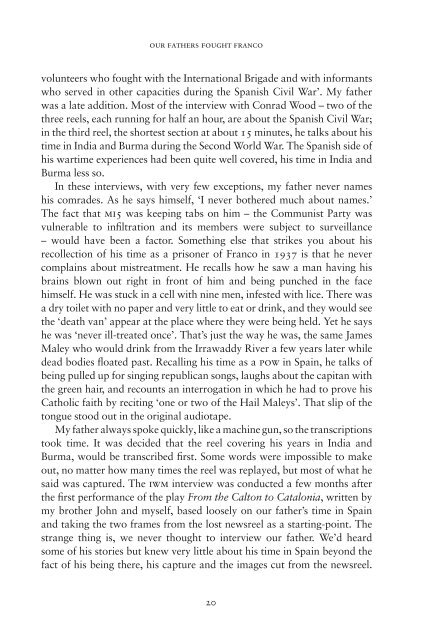Our Fathers Fought Franco by Willy Maley sampler
resonant piece of working class history, this book is a living link to four extraordinary stories. Why did these young men put their lives on the line and go to Spain to fight with the International Brigades? How did they all end up in the same prison cell? And what is their legacy today? James Maley, George Watters, Donald Renton and Archibald Williams were members of Machine Gun Company No. 2 of the XV International Brigade. This is the first book to focus on a small group of men who, from different starting-points, ended up on the same battleground at Jarama, and then in the same prisons after capture by Franco’s forces. Their remarkable story is told both in their own words and in the recollections of their sons and daughters, through a prison notebook, newspaper reports, stills cut from newsreels, interviews, anecdotes and memories, with a foreword by Daniel Gray. Our Fathers Fought Franco is a collective biography that promises to add significantly to the understanding of the motives of those who ‘went because their open eyes could see no other way’.
resonant piece of working class history, this book is a living link to four extraordinary stories. Why did these young men put their lives on the line and go to Spain to fight with the International Brigades? How did they all end up in the same prison cell? And what is their legacy today?
James Maley, George Watters, Donald Renton and Archibald Williams were members of Machine Gun Company No. 2 of the XV International Brigade. This is the first book to focus on a small group of men who, from different starting-points, ended up on the same battleground at Jarama, and then in the same prisons after capture by Franco’s forces.
Their remarkable story is told both in their own words and in the recollections of their sons and daughters, through a prison notebook, newspaper reports, stills cut from newsreels, interviews, anecdotes and memories, with a foreword by Daniel Gray.
Our Fathers Fought Franco is a collective biography that promises to add significantly to the understanding of the motives of those who ‘went because their open eyes could see no other way’.
Create successful ePaper yourself
Turn your PDF publications into a flip-book with our unique Google optimized e-Paper software.
<strong>Our</strong> <strong>Fathers</strong> <strong>Fought</strong> <strong>Franco</strong><br />
volunteers who fought with the International Brigade and with informants<br />
who served in other capacities during the Spanish Civil War’. My father<br />
was a late addition. Most of the interview with Conrad Wood – two of the<br />
three reels, each running for half an hour, are about the Spanish Civil War;<br />
in the third reel, the shortest section at about 15 minutes, he talks about his<br />
time in India and Burma during the Second World War. The Spanish side of<br />
his wartime experiences had been quite well covered, his time in India and<br />
Burma less so.<br />
In these interviews, with very few exceptions, my father never names<br />
his comrades. As he says himself, ‘I never bothered much about names.’<br />
The fact that MI5 was keeping tabs on him – the Communist Party was<br />
vulnerable to infiltration and its members were subject to surveillance<br />
– would have been a factor. Something else that strikes you about his<br />
recollection of his time as a prisoner of <strong>Franco</strong> in 1937 is that he never<br />
complains about mistreatment. He recalls how he saw a man having his<br />
brains blown out right in front of him and being punched in the face<br />
himself. He was stuck in a cell with nine men, infested with lice. There was<br />
a dry toilet with no paper and very little to eat or drink, and they would see<br />
the ‘death van’ appear at the place where they were being held. Yet he says<br />
he was ‘never ill-treated once’. That’s just the way he was, the same James<br />
<strong>Maley</strong> who would drink from the Irrawaddy River a few years later while<br />
dead bodies floated past. Recalling his time as a POW in Spain, he talks of<br />
being pulled up for singing republican songs, laughs about the capitan with<br />
the green hair, and recounts an interrogation in which he had to prove his<br />
Catholic faith <strong>by</strong> reciting ‘one or two of the Hail <strong>Maley</strong>s’. That slip of the<br />
tongue stood out in the original audiotape.<br />
My father always spoke quickly, like a machine gun, so the transcriptions<br />
took time. It was decided that the reel covering his years in India and<br />
Burma, would be transcribed first. Some words were impossible to make<br />
out, no matter how many times the reel was replayed, but most of what he<br />
said was captured. The IWM interview was conducted a few months after<br />
the first performance of the play From the Calton to Catalonia, written <strong>by</strong><br />
my brother John and myself, based loosely on our father’s time in Spain<br />
and taking the two frames from the lost newsreel as a starting-point. The<br />
strange thing is, we never thought to interview our father. We’d heard<br />
some of his stories but knew very little about his time in Spain beyond the<br />
fact of his being there, his capture and the images cut from the newsreel.<br />
20


















